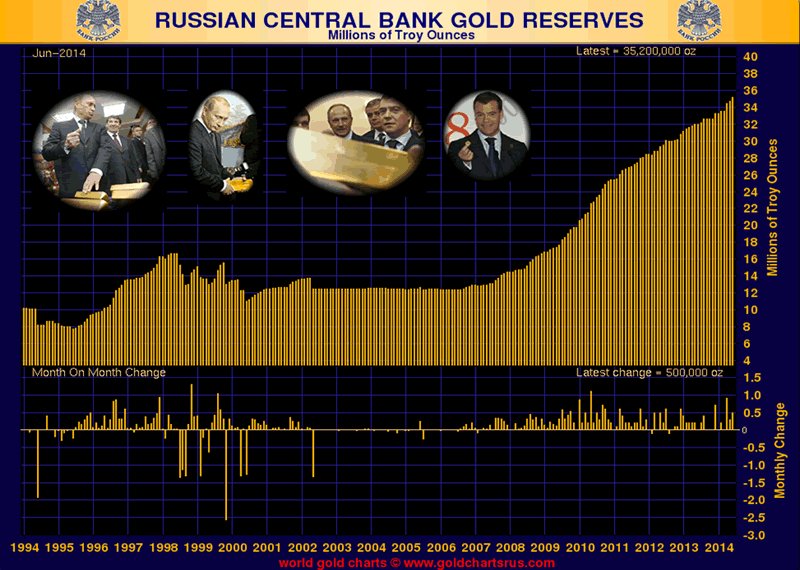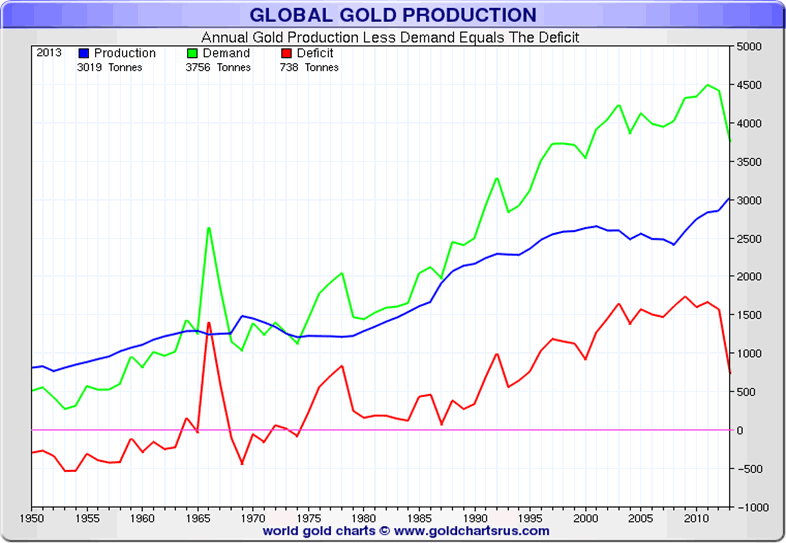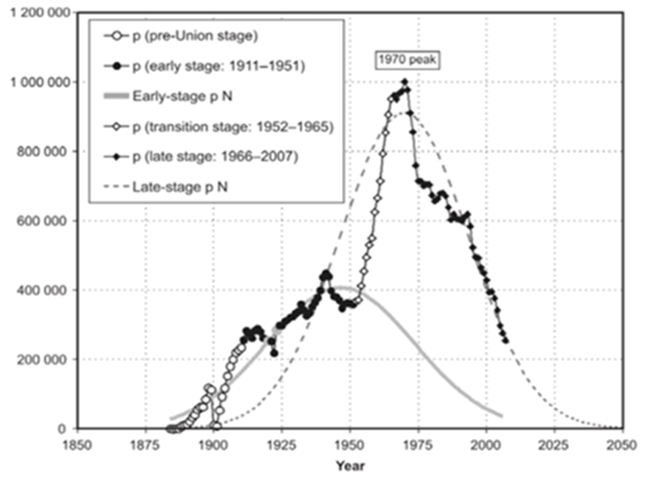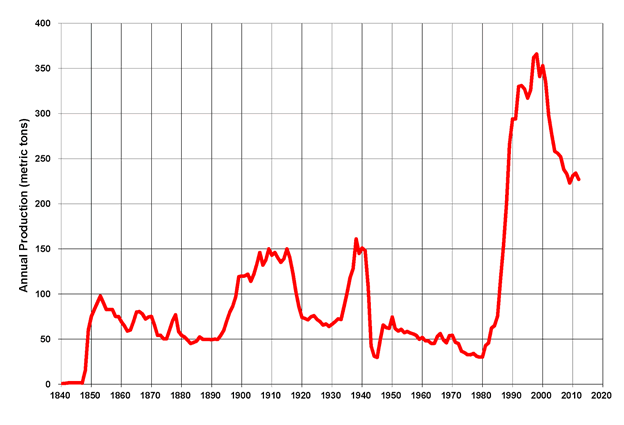Peak Gold? Russia To Surpass Australia As World No 2 Gold Producer
Commodities / Gold and Silver 2014 Aug 20, 2014 - 02:43 PM GMTBy: GoldCore
 Today’s AM fix was USD 1,294.50, EUR 973.75 and GBP 777.76 ounce. Yesterday’s AM fix was was 1,300.25, EUR 973.75 and GBP 781.17 per ounce.
Today’s AM fix was USD 1,294.50, EUR 973.75 and GBP 777.76 ounce. Yesterday’s AM fix was was 1,300.25, EUR 973.75 and GBP 781.17 per ounce.
Today’s LBMA Silver Price was USD 19.42 per ounce. Yesterday’s LBMA Silver Price was USD 19.66 per ounce.
Gold and silver fell yesterday - gold fell $3 to $1,295.90 and silver fell 19 cents to $19.49 per ounce.
Russian central bank acquired another 300,000 ounces worth $3.9 billion in July

Gold and silver have fallen below the $1,300/oz and $20/oz levels respectively. Gold traded marginally lower in trade in London after gold in Singapore also ticked marginally lower.
Volumes fell again today and gold futures trading volumes were 43% below the average for the past 100 days in London according to Bloomberg data. Futures traders remain on holiday and volumes remains low and are set to remain so in the coming days. Therefore there remains the risk of further price falls into the end of August prior to gold’s seasonal sweet spot in September through to February.
Silver for immediate delivery recovered 0.4% to $19.60 an ounce. Spot platinum fell 0.3% to $1,432 an ounce, while palladium fell from record highs and was 1.2% lower to $871 an ounce .
Russia continues to accumulate gold in an effort to protect the ruble and be prepared for a deepening of currency wars. The Russian central bank acquired another 300,000 ounces worth $3.9 billion in July. Russia's gold reserves rose to 35.5 million troy ounces in July from 35.2 million troy ounces in June, the central bank said on its website on today.
The value of Russia’s holdings declined marginally to $46.11 billion as of August 1 from $46.29 billion a month ago due to gold’s recent small price fall.
Russia To Surpass Australia As World No 2 Gold Producer - Peak Gold?
Yesterday, we reported on China’s intent to become a global gold hub and key player in gold price discovery. Another important player in the gold market at the moment is Russia. Their intentions are more realistic and not as ambitious of those of China. However, Russia sees gold as a valuable monetary asset that will protect the ruble in the continuing currency wars.
This is why, Russia has been one of the largest buyers of gold in recent months (see chart) - largest sovereign buyer and one of the largest buyers in general. Although we do not know how much gold the People’s Bank of China is quietly accumulating.
Russia now looks set to become the world’s second largest producer of gold, after China and surpassing current world number two gold producer Australia.
Mining Weekly reports:
“The Gold Royalty Response Group (GRRG) has warned that Russia could replace Australia as the world’s second-largest gold producer if it met production forecasts by the Gold Industrialists’ Union.
The Russian lobby group estimates that the country could increase its output to some 275 t during 2014, as the industry boosted production by 26.6% during the first half of the year.
GRRG spokesperson and MD of gold miner Silver Lake Resources Les Davis pointed out that gold exploration in Western Australia had dropped by some 50%, as profit margins in the sector continued to narrow.
“The big increase in Russian gold production comes at the same time as gold producers in Western Australia are putting exploration on hold,” Davis said.
“Almost two-and-a-half years ago the Western Australian government launched a review of the royalties paid for mineral commodities, including gold. High operating costs in Western Australia and low gold prices have made the sector increasingly marginal so most gold producers have put exploration on hold as they wait for the outcome of the review.”
Davis said the state’s gold miners were confronting an increasingly competitive global market and could not sustain any further cost increases.
“Our industry has been a mainstay of the Western Australian economy for more than a century, but we can’t compete if we continue to face increased cost burdens. We pay our fair share of taxes and royalties and we are competing in a very tough global market.”
The GRRG recently launched a social campaign to highlight the vital contribution made by the gold industry in an effort to sway public opinion on an increase in gold royalties.
The state government was currently undertaking a royalty review, which was expected to be completed by the end of 2014.”
Russia values its gold and this is one of the reasons that it bans gold exports and all gold production in Russia is bought and used in Russia itself - including by the Russian central bank.
The decline in gold production in Australia has been blamed on royalties and gold’s falling price in recent years. Yet, there is a real possibility that Australia, like many other gold producing countries, may have reached “peak gold.”
Geological constraints and the inability to find new sizeable gold ore deposits and the exhaustion of existing ore deposits had led to falling production in other large gold producing nations. Indeed some such as South Africa have seen sharp declines (see chart).

Recently, the decline in South African gold production was attributed to national electrical issues, power outages and industrial unrest. However, the scale of the decline at a time when gold prices has risen since 2001 and there has not been a corresponding decline in base metals mined in South Africa suggests that geological constraints may be leading to lower gold production.
Peak oil is a phenomenon familiar in the popular consciousness – peak gold is a phenomenon yet to be understood.
Peak gold is the date at which the maximum rate of global gold extraction is reached, after which the rate of production enters terminal decline. The term derives from the Hubbert peak of a resource.
South African Gold Production Continues To Plummet

Unlike oil and silver, which is destroyed in use, gold can be reused and recycled. However, unlike oil, gold is money, a store of value and a foreign exchange reserve and gold is slowly being remonetised in the global financial system and indeed may soon play a role in a new international monetary system.
In 2009, Barrick CEO Aaron Regent claimed that global production had peaked in 2000.
He told the Daily Telegraph newspaper at the RBC's annual gold conference in London that "there is a strong case to be made that we are already at 'peak gold'."
"Production peaked around 2000 and it has been in decline ever since, and we forecast that decline to continue. It is increasingly difficult to find ore," he said.
Ore grades have fallen from around 12 grams per tonne in 1950 to nearer 3 grams in the US, Canada, and Australia. South Africa's output has halved since peaking in 1970.
Peak gold may not have happened in 2000. Nor may it have happened in 2011. However, the geological evidence suggests that it may happen in the near term due to the increasing difficulty large and small gold mining companies are having increasing their production.
It is also signalled in the fact that most of the larger gold producing countries -such as Australia, the U.S., South Africa, Canada, Peru, Indonesia - have all seen production drops in recent years.
China and Russia are the two only large producers to have seen significant gold production increases. As sizeable ore deposits that were left untapped during the Communist eras are mined today.
U.S. Annual Gold Production

Peak gold has yet to be considered and analysed by the international financial community but there is a risk that it has happened or will happen soon. It should lead to much higher gold prices in time and gold’s inflation adjusted high of $2,500 per ounce remains a realistic long term price target.
The fact that peak gold may take place at a time when the world is engaged in a peak fiat paper and electronic money creation experiment bodes very well for gold’s long term outlook
This update can be found on the GoldCore blog here.
Yours sincerely,
Mark O'Byrne
Exective Director
IRL |
UK |
IRL +353 (0)1 632 5010 |
WINNERS MoneyMate and Investor Magazine Financial Analysts 2006
Disclaimer: The information in this document has been obtained from sources, which we believe to be reliable. We cannot guarantee its accuracy or completeness. It does not constitute a solicitation for the purchase or sale of any investment. Any person acting on the information contained in this document does so at their own risk. Recommendations in this document may not be suitable for all investors. Individual circumstances should be considered before a decision to invest is taken. Investors should note the following: Past experience is not necessarily a guide to future performance. The value of investments may fall or rise against investors' interests. Income levels from investments may fluctuate. Changes in exchange rates may have an adverse effect on the value of, or income from, investments denominated in foreign currencies. GoldCore Limited, trading as GoldCore is a Multi-Agency Intermediary regulated by the Irish Financial Regulator.
GoldCore is committed to complying with the requirements of the Data Protection Act. This means that in the provision of our services, appropriate personal information is processed and kept securely. It also means that we will never sell your details to a third party. The information you provide will remain confidential and may be used for the provision of related services. Such information may be disclosed in confidence to agents or service providers, regulatory bodies and group companies. You have the right to ask for a copy of certain information held by us in our records in return for payment of a small fee. You also have the right to require us to correct any inaccuracies in your information. The details you are being asked to supply may be used to provide you with information about other products and services either from GoldCore or other group companies or to provide services which any member of the group has arranged for you with a third party. If you do not wish to receive such contact, please write to the Marketing Manager GoldCore, 63 Fitzwilliam Square, Dublin 2 marking the envelope 'data protection'
GoldCore Archive |
© 2005-2022 http://www.MarketOracle.co.uk - The Market Oracle is a FREE Daily Financial Markets Analysis & Forecasting online publication.



